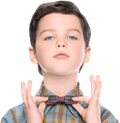WHERE TO GET THE BOOK: http://libgen.is/book/index.php?md5=F6B31A8DAFD6BD39A5986833E66293E6
People have been kind enough to link the audiobook in past posts, so hopefully they'll do that here, too.
In this chapter, Dr. Price goes over those who are often found to be Autistics who discover that they have been masking their whole lives without realizing. Again, lots of Literally Me  moments spread throughout for all to enjoy and cry about when traumatic memories you kinda just pushed down a long time ago come back up to the surface. Fun!
moments spread throughout for all to enjoy and cry about when traumatic memories you kinda just pushed down a long time ago come back up to the surface. Fun!
We're introduced to a few of these folks, starting with Bobbi. Bobbi is an autistic nonbinary person who was raised as a girl but never got clocked as autistic for their entire life until well into their thirties. Before that, they were just the weird kid who was shoved off to the side. Appropriately, Autistic women and gender minorities are the first group Dr. Price goes over, and how their misdiagnosis is often rooted in the "white boy who likes trains and talks like Rainman" stereotype of autism, and gender roles in general. He talks about "female Autism" and other such nonsense, and how being a social butterfly to compensate for Autism symptoms can lead to an internal life of incredible pain and needless self-sacrifice that goes completely unnoticed by everyone around the Autistic in question, and about his own gender transition as well.
After that, Dr. Price discusses the issues of ethnic minority Autistics, and how failing to mask can be downright dangerous for them, and how this necessity leads to terrible rates of underdiagnosis, and the overwhelming majority of therapists being white meaning they lack critical cultural context for the social aspects of treating Autism, not to mention how good ol' racism just turns them invisible to the people looking for more of those Sheldon Cooper types  . And again, the necessity of masking and how it parallels code-switching, meaning that Black Autistics in particular get to navigate even more complicated social variables now, and if they don't they can end up imprisoned or dead.
. And again, the necessity of masking and how it parallels code-switching, meaning that Black Autistics in particular get to navigate even more complicated social variables now, and if they don't they can end up imprisoned or dead.
After that, the outgoing Autistics who are highly verbal who are straight up told they don't have Autism to their faces becuause, you know, they're not so cringe that everybody feels okay being cruel to them without guilt. So though highly visible, their pain remains hidden, and people guilt them for it when they try to talk about it. More nuances on sensory seeking, predictability discussed.
Next, Dr. Price goes into an in-depth discussion of people with comordid conditions. ADHD is a big one (that's me!) and there's so much overlap between symptoms that some people think that they might very well be different expressions of the same thing. PTSD's another big one, and what's fun is lots of Autistic people also have PTSD from all the horrible treatment they've received from people their entire lives, including gaslighting therapists who try to "fix" them using ineffective therapies.
Lastly, there's that pesky "high functioning" label, basically "You can't be autistic because you're not a completely useless piece of shit! You can do a job that makes money, so you don't deserve to be scheduled for extermination!" There's lots to unpack in here, and I'm sure a lot of it is familiar to the people who are already interested in this book club. After that, some advice on seeking out fellow neurodivergents to find a community of similar people.
DISCUSSION:
- Any passages or quotes that stick out to you? Experiences similar to the ones described in this chapter?
- What hit you the hardest here?
- Was there anything about the communities featured in this chapter that you got new insight on? New things to relate to?
- Anything clarified in this chapter that relates to the last one for you?
Again, tag post to follow, and my thoughts later on once I have the time and energy.

 as a character readable as autistic.
as a character readable as autistic.